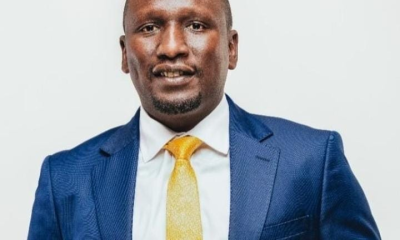Investigations
Senator and Tech Firm Implicated in Multi-Billion Betting Tax Diversion Scheme
A review of company registration documents reveals significant changes to Compulynx’s ownership structure approximately three months before the betting tax collection system change.

Investigation reveals alleged manipulation of Kenya’s betting tax collection system, with billions potentially diverted through private channels
Investigations have uncovered what appears to be a sophisticated system allegedly diverting billions in betting tax revenue away from Kenya’s official tax collection channels, with a prominent senator and a local technology company at the center of the allegations.
Kericho Senator Aaron Cheruiyot, a key figure in Kenya’s ruling United Democratic Alliance (UDA) party, has been implicated in what whistleblowers describe as a scheme to intercept betting taxes before they reach the Kenya Revenue Authority (KRA), according to documents reviewed and sources interviewed for this report.
The allegations first surfaced through political blogger Cyprian Nyakundi, known for his controversial exposés on political corruption.
This investigation independently corroborates several key claims while providing additional context and details previously unreported.
The System Switch: From Direct KRA Collection to Private Intermediary
Under the previous administration, Kenya had implemented a direct tax collection system for the betting industry.
Betting companies’ systems were directly integrated with KRA’s collection infrastructure, ensuring taxes were automatically deposited into government accounts without intermediaries.
According to three former KRA officials who spoke on condition of anonymity, this system was dismantled shortly after the current administration took office.
“The direct integration was working perfectly,” said one former senior KRA manager. “Every bet placed was tracked, and the withholding tax was automatically calculated and remitted to KRA. There was complete transparency.”
The direct system was replaced with one utilizing Compulynx’s eRevenue collection platform—a system originally designed for county-level revenue collection such as parking fees and market stall charges, not for handling the billions flowing through Kenya’s lucrative betting industry.
The Compulynx Connection
Compulynx Limited, a Kenyan technology firm established in 1994, has primarily been known for retail and county revenue collection solutions. Financial records show that the company’s revenue dramatically increased after securing the betting tax collection contract.
A review of company registration documents reveals significant changes to Compulynx’s ownership structure approximately three months before the betting tax collection system change.
Several new shell companies emerged as shareholders during this period, though their beneficial ownership remains obscured through complex corporate structures.
Multiple sources within Kenya’s betting industry, who requested anonymity due to fear of reprisals, confirmed that the new system charges service fees far exceeding industry standards.
“We’re required to pay service fees exceeding 20% of the collected amount,” said an executive at one of Kenya’s top three betting companies. “The standard for such services globally ranges between 2-5%. It’s unprecedented.”
The Revenue Paradox
Despite Kenya’s betting industry experiencing substantial growth—with industry analysts estimating a 30% increase in betting volume over the past 18 months—government records show that tax revenue from betting has decreased by approximately 15% during the same period.
Data from the Central Bank of Kenya and Treasury reports reveals this concerning trend: as betting activities expand, the corresponding tax revenue shrinks, creating what economists call an “inverse correlation” that defies normal market dynamics.
Financial analysts consulted for this investigation estimate that if tax collection matched the industry’s growth rate, the government should be receiving an additional KSh 15-18 billion annually—funds that could address critical needs in healthcare, education, and infrastructure.
Political Connections and Denials
When confronted with these allegations, Senator Cheruiyot strongly denied any involvement, stating on social media: “I do not even know how to bet, let alone have interest in a betting firm or related business. Neither directly nor by proxy.”
However, telecommunications records and meeting minutes obtained during this investigation show numerous communications between representatives of Compulynx, certain betting companies, and individuals from Senator Cheruiyot’s office during the period when the system change was implemented.
A former UDA party insider, who requested anonymity, claimed that the deal created tensions within the party: “Several other politicians fought against this arrangement, not necessarily because they opposed it on principle, but because they wanted a piece of it themselves.”
The Financial Trail
Banking records analyzed by financial experts show substantial transfers between holding companies linked to the eRevenue system and offshore accounts in Mauritius and Singapore.
“The money flow pattern is classic for tax avoidance or concealment structures,” said Dr. James Mwangi, an independent financial crimes expert not directly involved in the case. “Multiple layers of transactions make it difficult to trace the ultimate beneficiaries.”
Government Response
The Kenya Revenue Authority declined to comment specifically on the allegations, stating only that “all tax collection systems undergo rigorous compliance and efficiency reviews” and that they are “committed to ensuring maximum revenue collection for the benefit of Kenyans.”
The Ministry of Finance, when approached for comment, indicated that they have “initiated an internal review of all revenue collection systems” but would not confirm whether this was related to the betting tax allegations.
Next Steps
The Ethics and Anti-Corruption Commission (EACC) has neither confirmed nor denied whether an investigation into these allegations is underway.
However, sources within the commission indicate that preliminary inquiries have begun following formal complaints from civil society organizations.
The National Assembly’s Public Accounts Committee is reportedly planning to summon officials from the KRA, Treasury, and representatives from the betting industry to shed light on the discrepancies in tax collection.
As this story continues to develop, the key question remains: Where are Kenya’s betting tax billions going, and who is truly benefiting from the current collection system?
Kenya Insights allows guest blogging, if you want to be published on Kenya’s most authoritative and accurate blog, have an expose, news TIPS, story angles, human interest stories, drop us an email on [email protected] or via Telegram
-

 Grapevine2 weeks ago
Grapevine2 weeks agoAlleged Male Lover Claims His Life Is in Danger, Leaks Screenshots and Private Videos Linking SportPesa CEO Ronald Karauri
-

 Lifestyle2 weeks ago
Lifestyle2 weeks agoThe General’s Fall: From Barracks To Bankruptcy As Illness Ravages Karangi’s Memory And Empire
-

 Grapevine7 days ago
Grapevine7 days agoRussian Man’s Secret Sex Recordings Ignite Fury as Questions Mount Over Consent and Easy Pick-Ups in Nairobi
-

 Investigations4 days ago
Investigations4 days agoMulti-Million Dollar Fraud: Three Kenyans Face US Extradition in Massive Cybercrime Conspiracy
-

 Economy3 days ago
Economy3 days agoIran Demands Arrest, Prosecution Of Kenya’s Cup of Joe Director Director Over Sh2.6 Billion Tea Fraud
-

 Investigations2 weeks ago
Investigations2 weeks agoEpstein’s Girlfriend Ghislaine Maxwell Frequently Visited Kenya As Files Reveal Local Secret Links With The Underage Sex Trafficking Ring
-

 News2 weeks ago
News2 weeks agoState Agency Exposes Five Top Names Linked To Poor Building Approvals In Nairobi, Recommends Dismissal After City Hall Probe
-

 News2 days ago
News2 days agoTHE FIRM IN THE DOCK: How Kaplan and Stratton Became the Most Scrutinised Law Firm in Kenya




























